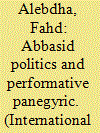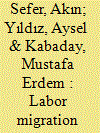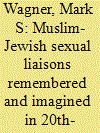|
|
|
Sort Order |
|
|
|
Items / Page
|
|
|
|
|
|
|
| Srl | Item |
| 1 |
ID:
178033


|
|
|
|
|
| Summary/Abstract |
The poet ʿAli ibn Jabala, also called al-ʿAkawwak, was a little known but significant poet who lived during the late 8th and early 9th centuries. This article examines his poetry in its political and cultural context to delineate the literary devices exploited by the poet in his poems of praise. Moreover, this paper interprets existing prose anecdotes claiming that al-ʿAkawwak's panegyric poem to the caliph al-Maʾmun's commander, Abu Dulaf al-ʿIjli, made the caliph so furious that he ordered the poet's execution, despite the poet having never composed any verses overtly criticizing the caliph. The argument is made that, within the tense political atmosphere of the time, the style that the poet embraced in praising the two commanders, Abu Dulaf al-ʿIjli and Humayd al-Tusi, intensified al-Maʾmun's anger toward the poet.
|
|
|
|
|
|
|
|
|
|
|
|
|
|
|
|
| 2 |
ID:
178036


|
|
|
|
|
| Summary/Abstract |
Although mountainous regions remained relatively isolated and almost untouched by the Ottoman rule, labor migration connected the inhabitants of these regions to the socioeconomic and political processes in the Ottoman Empire and beyond. Kruševo, a highland village located in present-day North Macedonia, provides an excellent case for understanding these connections. This paper presents systematic evidence from the Ottoman archives to document and analyze the social, economic, and demographic impacts of labor migration during this period. It provides an in-depth analysis of the Ottoman population and tax records of Kruševo in the 1840s, demonstrating the occupational profiles, migration patterns, and family and neighborhood networks of village residents during this period. Based on this analysis, it argues that labor migration was key to the transformation of social, economic, and demographic relations in rural communities and to the integration of even the most remote highland villages with the modernization processes that characterized the Ottoman Empire in the 19th century.
|
|
|
|
|
|
|
|
|
|
|
|
|
|
|
|
| 3 |
ID:
178034


|
|
|
|
|
| Summary/Abstract |
Despite mutual taboos against exogamy, memoirs and similar materials written by Jews from Yemen contain a number of anecdotes describing love affairs and sexual encounters between Muslims and Jews prior to the mass migration of the vast majority of Yemen's Jews to Israel in 1949–50. These stories associate these liaisons with vulnerability, poverty, and marginalization. In them, sex and conversion to Islam are intrinsically connected, yet this interreligious intimacy leads not to resolution but to ongoing identity crises that persist beyond the community's realignment with a majority-Jewish society. The staging of the anecdotes in rural areas where shariʿa norms held only nominal sway, in watering places and hostels where strangers might interact, and at dusk, when identity is difficult to discern, heightened their ambiguity.
|
|
|
|
|
|
|
|
|
|
|
|
|
|
|
|
| 4 |
ID:
178035


|
|
|
|
|
| Summary/Abstract |
This article explores the so far little explored animal dimension of the significant social, economic, and ecological transformations that occurred in Western Anatolia in the late Ottoman Empire. It focuses on how the use of the hybrid, one-humped “Turcoman” camel transformed the way in which trade and transport operated in the region. In light of Ottoman, Turkish, and European sources, it suggests that the camel was a visible yet often underestimated actor in the incorporation of Western Anatolia into global markets and integrating the camel as important history-shaping actor into the historical narrative allows us to better grasp the complex relationships that existed between humans, nature, and technology and to change the way we think about the Ottoman Empire.
|
|
|
|
|
|
|
|
|
|
|
|
|
|
|
|
| 5 |
ID:
178032


|
|
|
|
|
| Summary/Abstract |
This article analyzes the increased visibility and frequency of public weeping by the Turkish president, Recep Tayyip Erdoğan. Building on the literature that conceptualizes populism as a particular political style, I argue that crying in public can be understood as a populist performative act of legitimation, serving to dramatize the basic components of the populist discourse. I also contend that the increased frequency of public weeping by Erdoğan relate to two major dilemmas that populists in power encounter. Both dilemmas stem from the growing discrepancy between populist rhetoric and practice, diminishing the credibility of the populist leader. Signaling emotional authenticity, Erdoğan’s tearfulness serves to communicate a message of closeness to the people and sustain the anti-elite rhetoric at a time when his political power and economic wealth increasingly set him apart from the politically and economically marginalized. It also attempts to justify authoritarian practices while sustaining the claim to rule in the name of popular power and mobilize constituents against the opposition.
|
|
|
|
|
|
|
|
|
|
|
|
|
|
|
|
| 6 |
ID:
178037


|
|
|
|
|
| Summary/Abstract |
This article investigates the Ottoman state's endeavor to create the “second Egypt” by consolidating its imperial authority along the coastline and hinterland of Cyrenaica from 1897 to 1904. It examines the strategic settlement of Cretan Muslim refugees in territories situated between Benghazi and Derna and in al-Jabal al-Akhdar following the Cretan insurrection of 1897–98. I argue that Cretan Muslim refugees-turned-settlers served as skilled agriculturalists and experienced armed sentries who were integral to the Ottoman state's plans for economic development and expansionism in Cyrenaica. Focusing particularly on ‘Ayn al-Shahhat and Marsa Susa, this article contends that the establishment of Cretan Muslim agricultural colonies served to undermine the political and economic position of the Sanusi order by appropriating the order's properties and access to resources. This work offers a new perspective on how the Ottoman state reasserted its sovereignty in its frontier territory in Cyrenaica by harnessing the power of migration.
|
|
|
|
|
|
|
|
|
|
|
|
|
|
|
|
|
|
|
|
|